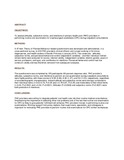| dc.description.abstract | OBJECTIVES:
To assess attitudes, subjective norms, and intentions of primary health-care (PHC) providers in performing routine oral examination for oropharyngeal candidiasis (OPC) during outpatient consultations.
METHODS:
A 47-item Theory of Planned Behaviour-based questionnaire was developed and administered, in a cross-sectional survey, to 216 PHC providers (clinical officers and nurses) working in 54 clinics, dispensaries, and health centers in Nairobi Province in January 2010. The constructs - attitudes, subjective norms, and perceived behavioral control (dependent variables) - and their individual indirect (direct) items were analyzed for scores, internal validity, independent variables (district, gender, years of service, profession, and age), and contribution to intentions. Perceived behavioral control had low construct validity and was therefore removed from subsequent analyses.
RESULTS:
The questionnaire was completed by 195 participants (90 percent response rate). PHC provider's attitudes, subjective norms, and intentions to perform an oral examination during outpatient consultations were highly positive, with mean scores of 6.30 (0.82), 6.06 (1.07), and 5.6 (1.33), respectively, regardless of sociodemographic characteristics. Indirect attitude and subjective norms were strongly correlated to their individual items (r=0.63-0.79, P<0.05 and r=0.78-0.87, P<0.05) and moderately to their direct items (r=0.44, P<0.0001 and r=0.52, P<0.0001). Attitudes (P=0.0026) and subjective norms (P<0.0001) were both predictive of intentions.
CONCLUSIONS:
PHC providers were willing to integrate patients' oral health care into their routine medical consultations. Emphasizing the importance of detecting other oral problems and of the fact that routine oral examination for OPC is likely to give patients' fulfillment will enhance PHC providers' morale in performing routine oral examinations. Winning support from policy makers, their supervisors, specialists, and colleagues is important for motivating PHC providers to perform routine oral examinations for OPC at their workplaces. | en_US |

